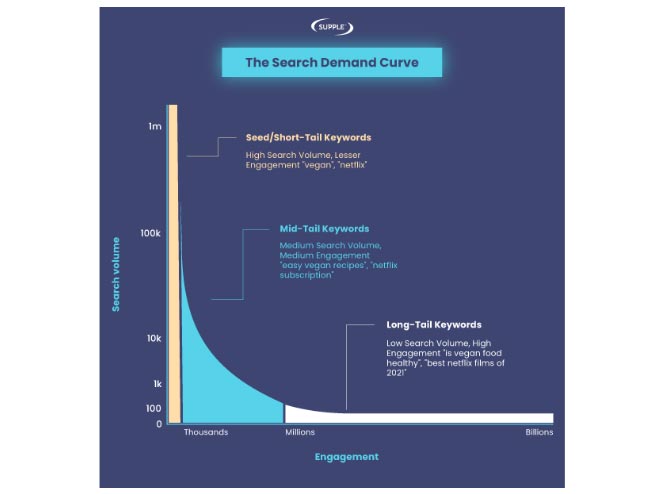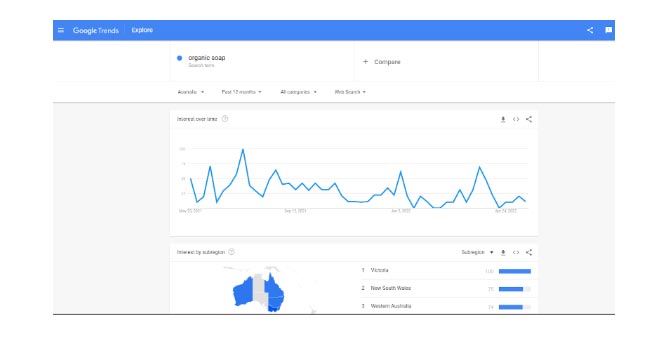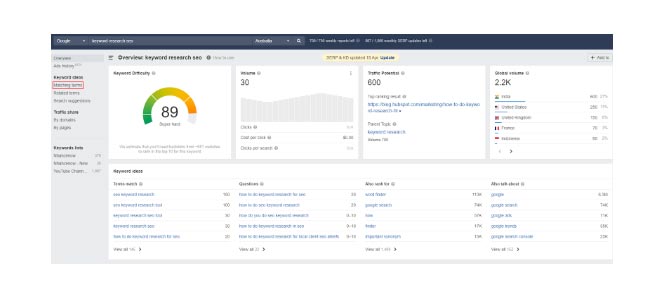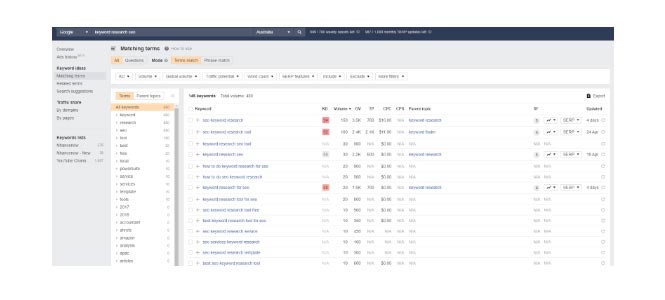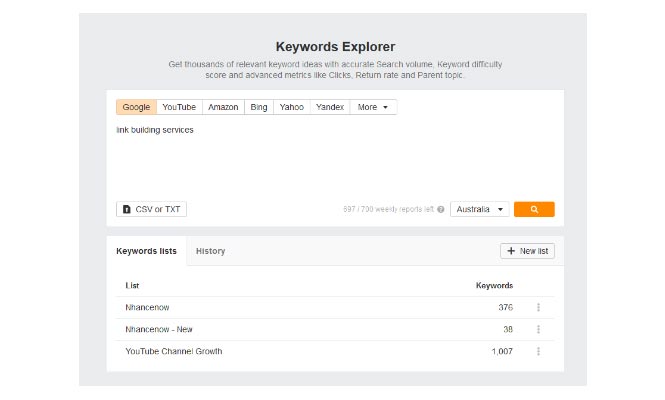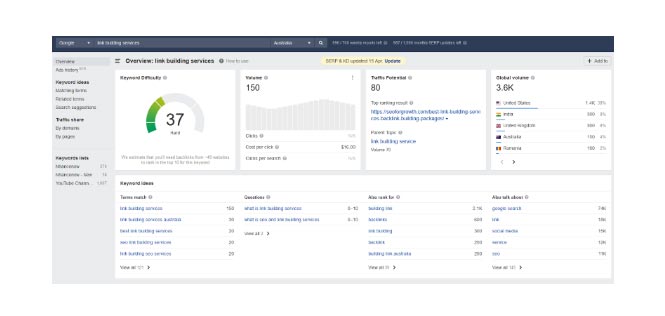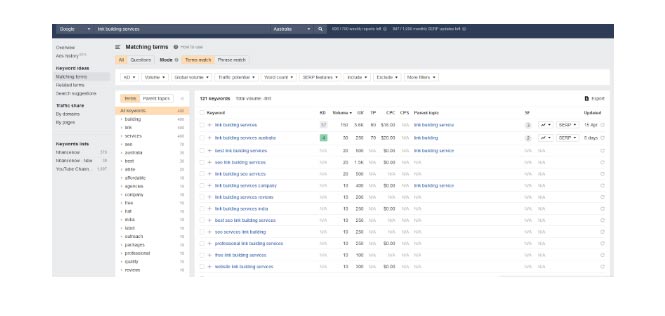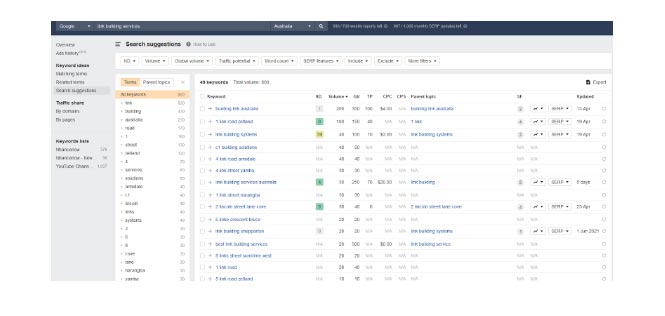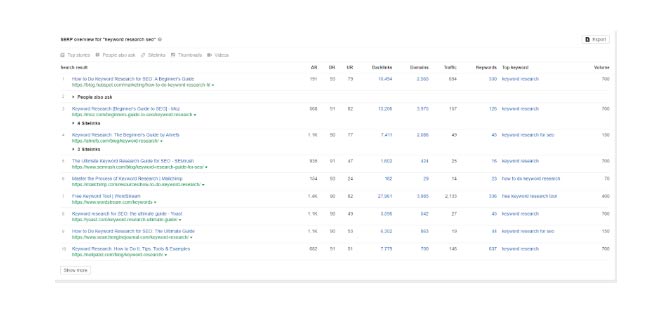
Keyword research is an essential tool for any business that wants to succeed in the digital world. The Supple team will research and target specific SEO keywords that help your business rank higher in search engine results pages (SERPs) and drive more relevant traffic to your website. Keyword research can also help us better understand your customers’ needs and pain points, allowing us to create more targeted content that resonates with your audience.
Get the Inside Scoop on Your Website’s SEO – Try Our Free SEO Audit Tool Today!
Everything You Need to Know About Keyword Research for SEO
Keyword research is an essential tool for any business that wants to succeed in the digital world. The Supple team will research and target specific SEO keywords that help your business rank higher in search engine results pages (SERPs) and drive more relevant traffic to your website. Keyword research can also help us better understand your customers’ needs and pain points, allowing us to create more targeted content that resonates with your audience.
You have done it all!
You have launched a terrific, user-friendly and functional website for your business. You are building your brand on social media. You are consistently producing content on your super-active blog.
But none of that matters if you do not have a sound SEO strategy to support these tasks. At this point, you may want to immediately turn to an SEO agency that can help you out. You would not be wrong in thinking so — SEO can get complicated.
Even then, it is always a good idea to stay updated with the basics and understand more about the crucial pillars that constitute your SEO strategy.
Keyword Research is one of those pillars.
So, without further ado, let us get started.

OUR SEO PROCESS
The First Page of Google!
Research
In this phase, our SEO consultants will work with you to understand your business and define the goals of our SEO campaign. We will perform competitor research and search intent analysis before identifying the keywords that we think you should target.

Audit
Our comprehensive SEO audit looks at everything from content gap analysis and internal links to site architecture, backlink profiles, technical SEO, and crawl optimisation. Our team will identify all the growth opportunities based on your current website and SEO performance.

Strategy
In the strategy phase, we evaluate the findings from our audit and prioritise SEO tasks. We have an Impact / Effort / Action Priority Matrix that we follow to prioritise tasks. Our SEO specialists create an action plan for your SEO campaign, which includes a timeline with key milestones we have to achieve.

Implementation
Our SEO team, designers and developers work with you to start actioning the high priority tasks from the previous phase. Following this, we get onto the low priority tasks. This process allows us to knock out some early quick wins, then have a strategy in place to tackle the high effort tasks. We keep the low rewards tasks on the back burner and tackle them when we get time as the campaign progresses.
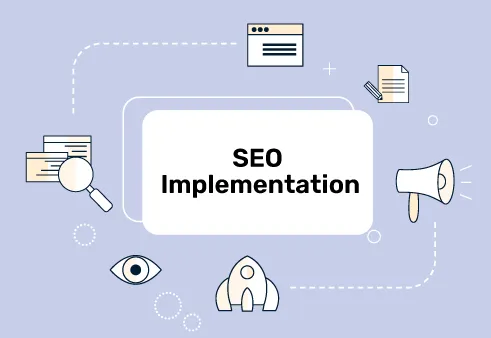
Reporting
We have systems and processes in place to make sure that we track and report on your SEO campaign.
As you can imagine, this is not the end. Our SEO consultants are constantly analysing and tweaking your campaign to achieve the best possible results on the 1st page of Google. It is an ongoing process, and we are with you for the long term!

Research
In this phase, our SEO consultants will work with you to understand your business and define the goals of our SEO campaign. We will perform competitor research and search intent analysis before identifying the keywords that we think you should target.

Audit
Our comprehensive SEO audit looks at everything from content gap analysis and internal links to site architecture, backlink profiles, technical SEO, and crawl optimisation. Our team will identify all the growth opportunities based on your current website and SEO performance.

Strategy
In the strategy phase, we evaluate the findings from our audit and prioritise SEO tasks. We have an Impact / Effort / Action Priority Matrix that we follow to prioritise tasks. Our SEO specialists create an action plan for your SEO campaign, which includes a timeline with key milestones we have to achieve.

Implementation
Our SEO team, designers and developers work with you to start actioning the high priority tasks from the previous phase. Following this, we get onto the low priority tasks. This process allows us to knock out some early quick wins, then have a strategy in place to tackle the high effort tasks. We keep the low rewards tasks on the back burner and tackle them when we get time as the campaign progresses.

Reporting
We have systems and processes in place to make sure that we track and report on your SEO campaign.
As you can imagine, this is not the end. Our SEO consultants are constantly analysing and tweaking your campaign to achieve the best possible results on the 1st page of Google. It is an ongoing process, and we are with you for the long term!


Keywords are perhaps one of the most integral parts of your SEO strategy. So it is a good idea to begin by defining keywords.
Getting a better understanding of the search terms that your users are inputting on search engines to find services and businesses similar to yours, is crucial. You need to integrate these terms into your website so that your website can get visibility triggered by relevant search queries.
When these terms are added to your online content, your search engine performance can improve significantly. These terms are called keywords.
Now, we can talk more about keyword research and all it entails.
Keyword research as you might have already guessed is the process of finding specific search terms that are most relevant to your business and products/services. The process of keyword research starts by finding the right SEO keywords, sorting them, and then using them to develop an informed keyword strategy for your SEO performance.
You stand to gain a lot of value from this process. After all, 0.16% of keywords drive more than 60% of all online searches
Conducting proper keyword research can be quite beneficial for the SEO performance of your business and offer you plenty of benefits. But let us delve deeper into that a bit later.
First, let us understand the types of keywords that every business should be aware of.
Types of Keywords
Considering the many different types of businesses and industries out there, and their varying business needs, having one keyword research strategy is not plausible. Every business has customers with unique buyer journeys on which their keyword research will be based.
Before we explore the different types of keywords, you should familiarise yourself with the term — “search intent”. Understanding the search intent behind a term is important to gauge the intent behind the searches of your target audience. Understanding the search intent can make it easier for you to grab your target audience’s attention.
Not to forget, understanding and targeting the right keywords can help you win SERP features, that in turn can boost your search engine visibility and rankings
Informational
Informational searches are those where the users are looking for specific information on a subject. So, it could be something as simple as, “what is seo?” or something that requires a more detailed answer such as, “how can climate be averted?” Basically, informational searches indicate that the searcher is looking to learn more about a subject.
For the business-oriented readers here — these are your Top of Funnel (ToFu) customers.
Mapping keywords to capitalise on these searches will help you educate and increase awareness among your prospective customers.
Navigational
In the world of shortcuts, it is no surprise that you find yourself looking for a specific webpage on Google instead of searching for it on the website. The process is quite similar to the GPS you use on your phone when you want to travel from Point A to a definitive destination.
Navigational searches are those wherein the searcher knows the destination. However, they find it easier to type the destination on Google if they are unsure about the URL, or have to type the entire URL.
Again, for the business-oriented readers, these are your Middle of Funnel (MoFu) customers.
So, search queries for navigational searches can be as simple as “Facebook” or as direct as “Twitter login page”.
Transactional
Transactional searches are exactly what they sound like. Transactional searches happen when a prospect is near the end of their buying journey. These are searches made with the intent to make a purchase. So, these are your Bottom of Funnel (BoFu) customers.
By the time a user inputs such search queries, they are already sure about what they want to purchase. They are simply looking to be directed to the right place to make the transaction.
You can leverage this opportunity to direct customers to your website for the transaction by leveraging keywords for SEO that satisfy the transactional search intent.
Transactional queries such as “buy iphone 13” or “best deals on macbook pro” indicate clearly that the customer is looking to buy something specific. They will make the purchase as soon as they find the right place or platform to do so.
Now that you understand the importance of search intent and the role it plays in your keyword research, let us look at another important aspect that you should know about.
Keyword Variations
You might have noticed that while some searches consist of one word, some are longer — almost complete statements or questions. These differences point out the many keyword variations that you should know about.
There are primarily three major keyword variations that you should know about. Take a look at this Search Demand Curve, which portrays the three keyword variations.
We will now discuss these three variations in a little more detail.
Long-tail
Long-tail keywords get their name from their position on the search demand curve.
Long-tail keywords are often highly encouraged for companies that want to target customers that are closer to making a purchase. Long-tail keywords consist of longer phrases and are often more specific in nature. They are known to be more conversion-oriented, even though they attract fewer searches.
Let us look at an example of how long-tail keywords work. Say, you have a footwear brand that sells soft-sole shoes for men and women. Your website is probably unlikely to appear on the searches for a keyword such as “footwear”.
On the other hand, a keyword like “soft sole shoes for men” or “mens soft sole slippers” might have more relevance to your products. By incorporating these keywords, you are more likely to rank higher for searches by your target audience.
Mid-tail
If you took a good look at the search demand curve we shared earlier, you already know what mid-tail keywords are. They fall between the short-tail and long-tail keywords and are often referred to as “chunky”.
This is because they combine the best of both worlds in a way. They are definitely more detailed than short-tailed keywords, and so they are more specific and moderately competitive. Mid-tail keywords usually contain two or three search terms.
Search terms such as “dentists in adelaide” or “effects of climate change” are some examples of mid-tail keywords. Having a good balance of mid-tail keywords along with the long-tail keywords makes it easier for you to tap into the immense search volume they attract.
Short-tail
After gaining such a good understanding of medium and long-tail keywords, short-tail keywords are not that difficult to gauge. These are one-word search terms that users often use in their searches. Short-tails have large search volumes but are also highly competitive. Also, remember that they are very few in number.
To put this in perspective, short tail keywords constitute less than 1% of total search terms recorded by Google.
This basically means that while you can include these keywords in your content to increase your searchability, it is unlikely that they would help you rank. Most importantly, it would be quite difficult to target the right audience with search intent that you can leverage if you rely extensively on short-tail keywords.
Some examples of short-tail keywords include “apple”, or “tesla”. It would be quite difficult to gauge what exactly the user wants to search for with these terms unless there’s more context, right?
Case Studies
Return on Investment for business owners.
By now, you would indeed have a basic understanding of what keywords and SEO keyword research are all about. SEO is the only strategy that can help businesses make a dent in search engine results organically. Plus, keyword research is the only way you can identify what your prospective customers are searching for.
With that in mind, we can easily anticipate the importance that keyword research may hold in SEO.
Now let us talk more about the importance that keyword research holds in the field of SEO.
Helps to Climb The SERP Ladder
The logic here is quite sound and simple — search engines consider content a strong factor in determining your website ranking. Having the right SEO keywords on all your web pages ensures that they contain relevant search terms that your target audience is likely to look for.
Doing effective keyword research ensures that you have the most high-performing keywords on your website. By gauging how and what terms your target audience is using to look for services/products relevant to you, you can rank higher on the SERP — organically.
Gain Understanding of Your Target Audience and their Search Intent
Keyword research is quite multifaceted in the benefits that it offers to all kinds of businesses. The primary benefit of keyword research is that these terms can help you get a better understanding of your target audience. The keywords will also give you valuable insights into the search intent behind them.
The result? These insights can then effectively inform your content strategy as well as your overall marketing strategy. Plus, mapping keywords based on the stage of the sales funnel that your target audience is in, can be more beneficial than integrating keywords blindly and waiting to yield results.
Well-conducted keyword research will help you identify the right keywords that will attract the target audience to your website. It will also identify the “wrong” keywords that will cause them to bounce away from your website.
Optimise your Website Content
Needless to say, content plays a vital role in determining your SEO and website performance. Keyword research can help you come up with a lot of ideas regarding the topics that you want to include in your content. Producing content on such high-performing keywords will undoubtedly help you amplify your content strategy.
A sound content strategy, and SEO-friendliness in terms of keyword research and more, can help you optimise your website content.
Sound Use of Competitor Analysis
Contrary to popular belief, keywords do more than inform you of the topics and terms you should be covering on your website. It is a productive practice to analyse how your competitors are doing in terms of content and keyword research.
Getting a better understanding of the keywords that are working for your competitor will give you a better overview of which ones to include in your website. Conducting analyses of competitors will also help you outrank them in the SERPs, and redirect more of their traffic toward your website.
A thorough SEO keyword analysis will help you in more ways than one — be it for your own website, or for evaluating your competitors.
Get Placed in Featured Snippets
When you are a growing brand that wants to gain the required searchability and visibility on the SERP — there is some good and bad news.
The bad news is that getting there is quite tricky, especially if you are in a highly competitive industry. The good news is that you have the opportunity to take the center stage with the help of SERP features.
With the right keyword research strategy in place, you can target SERP features such as Featured Snippets and Rich Snippets that occupy a prominent position on the SERP. Using the right keywords and targeting the right search intent, can help you stay visible on the SERP features.

Client Testimonials
about Our Digital Marketing Services.
- 428 Google Reviews
- 4.9
Extremely reliable and super friendly staff. Jani and Sam helped us with our digital strategy. Would recommend to everyone who wants to get their SEO done.
Mark, Ron and Param from have been incredible to work with. From the very beginning, they took the time to understand our business goals and crafted a clear SEO strategy that is working really well.
Mark and Jani are fantastic to deal with and business has never been better
We are super impressed with this SEO team. They’re honest, transparent, and really know their stuff. They made everything easy to understand and were great to work with from the start. We saw our targeted keywords hit page one with half of them in the #1 spot, and organic traffic is up by nearly 20%. We recommend Supple for fast and high quality results.
I have to speak very highly of the crew of Supple Digital, Mark, Jani and Abbas do an amazing job of my website. Very highly professional and knowledgeable of their products and services. If you are in need of a good website go to these guys
View More Reviews

There are many different ways to approach keyword research — every type of keyword research has a lot of benefits to offer. It is important to gauge the keywords for SEO that are most relevant to your business so that you can consistently benefit from them. Doing this will also help you create a sound keyword research strategy for your business.
So before you embark on a keyword research strategy, identify the primary business goals that you want to accomplish. Next, let us understand the different types of keyword research that you can conduct for SEO.
Informational Keyword Research
Say, the search intent behind the search terms that your target audience uses is identified as informational. Now you need to have content that satisfies that specific search intent, right?
Sure, your products and services deserve to be highlighted to your target audience, but not always. When users are looking for extra information, that is exactly what they should be getting.
Here’s where your keyword research can inform your content strategy and highlight the need for having blogs on your website. You need to have educational content that targets making your top of funnel users more aware of your product or service. Educational content is great for another reason — most SERP features can be targeted for informational search intent.
Focus your keyword research on this aspect and find the ones that are most likely to optimise the content on your blog. For such content, you must measure some important metrics such as the Monthly Search Volume (MSV) and the organic traffic.
Doing diligent informational keyword research to have the right kind of content on your blogs and website will ensure that users perceive you as a credible source for information and even an expert on the subject.
Transactional Keyword Research
When you have provided enough information for the users to make an informed purchase decision, you are already doing a good job. Satisfying your users’ informational search intent is of no use if you can not capitalise on the piqued interest by targeting transactional searches.
Since transactional search involves users looking specifically for the right websites or pages to complete their transactions, you need to target relevant keywords for SEO. One sure-shot way you can make transactional searches work in your favour is identifying and leveraging your branded keywords.
Actively seek out any branded keywords that can be added to your product pages, and your service or contact pages. These keywords will help you leverage the searches in which users are directly searching for your business with transactional search intent. These keywords are also important to consider when you invest in paid advertising.
Some of the important metrics that you should be considered in this regard include Cost-Per-Click (CPC) and the number of clicks that you are getting on your indexed pages. Transactional keywords can be leveraged even more if you include location in the searches. This would help you gain customers in the vicinity of your business, who are looking for a local business to transact with.
SEO Team Lead
company's online marketing goals.
- Bishal Shrestha
- Head of SEO (9+ Years Experience)
Bishal Shrestha is an innovative SEO leader and digital strategist with over 9 years of expertise in driving organic growth for businesses across diverse industries. Bishal combines technical proficiency with strategic vision, excelling in data-driven decision making and delivering measurable results. He specialises in technical SEO optimisation, advanced analytics, and scalable growth strategies.
Bishal brings a unique blend of software engineering background and marketing acumen to his role at Supple Digital. With certifications in Google AdWords and Google Analytics, he leads comprehensive SEO campaigns that consistently elevate brands in competitive digital landscapes. His holistic approach focuses on sustainable, long-term growth through innovative solutions.

We have talked quite a bit about what is keyword research and why it is important for boosting the SEO performance of your website.
We are sure you are eager to get started with the actual process of keyword research by now. Keep two things in mind before embarking on this learning journey — you should have a good knowledge of your industry, and you should have the willingness to learn how to use keyword research tools.
So, the question now is — how to do keyword research for SEO?
With that in mind, let us look at the step-by-step process that you can follow to conduct effective and productive keyword research.
Step 1 – Identify Seed Keywords for Your Business Niche
The seed keyword, as the name suggests, is the beginning of any keyword research process. Seed keywords lay the foundation and are usually terms that can then give rise to several keyword ideas. Your seed keywords are also terms that define your business niche and help you in the process of identifying your competitors.
Finding seed keywords is not that difficult — all you need to do is enter terms that your target audience is likely to search for when they are looking for your product/service.
For example, if your business sells organic handmade soaps, some of the seed keywords that you would be looking at can include:
- Handmade soaps
- Organic soaps
- Natural handmade soap
The next question that you might have is — how do I find the relevant seed keywords for my business?
Well, this process can be as simple and as lengthy as you want it to be. You can search keywords on Google just like you search for everything else!
You can rely on Google to autocomplete your query to find the keywords. So, for the above example, typing ‘soap’ and a few related terms can fetch you the keywords that you should consider. Other than this, you can also type in your business niche, and check out the related keyword lists that pop up on the SERP.
What’s more, you can also check the People Also Ask (PAA) section for your search queries to find relevant keywords that you should consider.
These aforementioned ways are the simple ones that we had mentioned. However, you can also consider a few other ways to figure out what your ideal customer is looking for.
To begin with, you can use Google Trends. Google trends will offer insights into the interest trends of the pattern in your selected region and will also help you explore regions that have shown the most interest in it. For example, here’s what popped up when we searched for “organic soap” on Google Trends.
Of course, there are also other tools that you can use for fetching such detailed insights about your topic. You can check Forums and platforms such as Reddit and Quora to see what people are talking about the subject. Moreover, you can also do a similar search on social media and gauge the public reaction and interest in the subject.
All of these aforementioned ways are great for getting you started with a few seed keywords related to your business niche. But if you are looking for a broader or more detailed list of keywords, consider using a keyword research tool for SEO to attain your goal.
Step 2 – Find All Related Keyword List
Now, more often than not, you may not find the exact keywords that your users are utilising to conduct searches. Plus, identifying and including only some of the keywords that are relevant to your business might make it difficult to rank higher on the SERPs.
With that in mind, you should be actively looking for ways to find all the relevant keywords and search terms that might help your business optimise content.
Let us look at how you can find a list of related keywords to your seed keyword, using Keyword Explorer by Ahrefs. To understand the process better, we will look at how to find informational keywords and transactional keywords.
Keyword Explorer
Keyword Explorer is a great tool to explore when you are looking to conduct detailed keyword research and produce a list of related keywords. We will explore the tool and all it has to offer in detail in a later section.
For now, let us get started with the step-by-step process that you can follow to conduct informational keyword research using this tool.
Step 1: Go to Keyword Explorer
Start by logging into your Ahrefs account. Once you gain access to your dashboard, click on ‘Keyword Explorer’. This will redirect you to the keyword research tool screen.
Step 2: Type a Keyword Related to Your Niche
Time for the actionable part now. Select the most relevant keyword related to your business niche or subject for which you are producing content. For this example, we are considering “Keyword Research SEO” and checking the results that we can come up with.
Alternatively, you can also input multiple targeted or seed keywords to fetch the most related and relevant keyword ideas. Ensure to choose the target location for the keyword research before confirming your search.
Step 3: Explore ‘Matching Terms’
As soon as you initiate the search, you will be redirected to a window that will give you the primary insights related to your keyword. It may look something like this:
You can see that you will be able to see a wide range of metrics on this screen starting from the difficulty level of ranking for this keyword, several keyword ideas, and details regarding the volume. Take note of these metrics so that you can have detailed and actionable keyword research results.
Now, click on ‘Matching Terms’ on the left-side menu, to get a list of keywords that contain the terms that you have included in your search.
These are the closest matches to keywords that you have entered and are likely to be the most high-performing keywords on the subject for you. Ensure to pick the ones that indicate a large search volume, and lower keyword difficulty. These are most likely to help your content/pages rank for those keywords.
ay na haji 2 blog mate pan images joise mare
To ensure that you have thoroughly covered all the keywords that can produce results for your content, put in that extra effort to list down the relevant keywords. At this point, you want to click on ‘Related Terms’ and ‘Search Suggestions’ from the menu as well.
You can pick the keywords that seem most relevant to your business niche from this list and add them to your keyword research SEO sheet. Remember the high search volume and low keyword difficulty rule that we followed for the previous step.
By the time you are done with all the steps, you would be able to have a comprehensive list of all the informational keywords related to your business niche or subject.
With that out of the way, let us now take a look at how to conduct transactional keyword research with the help of this tool. Although, it should not be that difficult to understand, now that we have already carried out a detailed search.
Step 1: Type Keyword in Keyword Explorer
Start by typing in your transactional keyword in the Keyword Explorer tool. Set the location the same way we did for the previous search.
For this example, we are doing keyword research for “Link Building Services”. Let us now proceed with the search and look at the results we get.
So, now you have all the metrics such as keyword difficulty, volume, and related keyword lists as well as the top-ranking pages for the keyword.
Step 2: Explore ‘Matching Terms’
Next, click on ‘Matching Terms’ from the left-side menu to find the top keywords that contain the words included in the keyword you searched for.
Notice that you will see a wide range of keywords containing geographical locations. These are great keywords to consider when you also want to optimise for local SEO.
Step 3: Explore ‘Related Terms’ and ‘Search Suggestions’
We will, of course, explore the ‘Related Terms’ and ‘Search suggestions’, just the way we did for the above example for informational search.
Now that you have a list of related terms pertaining to the keyword that you are researching, we will also list down the search suggestions that you may need to consider for a more comprehensive keyword research report.
You will see that the search suggestions have a wide range of terms that are not related to the subject at all. Ensure to filter the ones that are most relevant to your niche, and include them in your keyword list.
Now, you will have a detailed and comprehensive list of transactional keywords for your business.
Perform Content Gap Analysis
One thing to remember when you are conducting SEO keyword research is that your competitors play just as much of a role as you in deciding your content strategy. Sure, this does indicate the need for competitor analysis, but also for identifying the content gaps.
Conducting a content gap analysis can help you identify the holes in your content strategy and improve it so that you can up your content quality. You can analyse your competitors’ content to understand the primary gaps and find effective ways to bridge them.
The results of the analysis will help you tweak your existing content, as well as provide valuable ideas for any new content that you want to produce. Especially take a good analytical look at your competitors’ web pages and add valuable pages to your website accordingly.
You can use your keyword research tool to check which keywords are easy to rank for and have not been leveraged enough by your competitors. Therein lies the content gap that you can capitalise and profit from.
Content Audit of Top Ranking Pages
Now, you have your content gap analysis and SEO keyword research out of the way.
Next, you want to conduct a complete content audit of the pages that are ranking really well for the keywords that you have just handpicked. Keyword Explorer by Ahrefs can help you out with this as well.
While doing your keyword research, click on the keywords to see the top pages that are ranking for that particular keyword. This is especially applicable for informational keyword searches. For instance, when we click on ‘keyword research for seo’ from the example earlier, here are the top-ranking pages:
It is recommended that you conduct a thorough content audit of these pages to understand what is working in their favour. You can then ensure to include similar elements and considerations in your own content pieces as well.
Step 3 – How To Choose The Right Keywords During Keyword Research
By now, you already know the steps that you need to take to draw up a detailed list of keywords related to your business. In the previous step, when we were listing down the keywords, we had suggested a few key metrics that you should consider.
However, to ensure that you have the right keywords that can generate the desired results for your SEO performance, you need to consider all the applicable metrics. Here are a few that you should absolutely pay attention to —
Search Volume
This is perhaps the most vital metric that you will need to look at while selecting the right keywords for your content. It indicates the average number of times users have searched for the term in the selected region, and time period.
The key aspect to note here is that this metric indicates the number of searches and not the number of people. Also, remember that since the search volume considers the average, it may not remain consistent throughout the year.
It is always a good idea to check the global search volume in conjunction with your regional search volume.
Informational Searches
Keywords with informational search intent usually have a very high search volume. Logically, a lot more people are out there searching for information to learn, than with any other intent. The ones that have a high search volume are likely to bring traffic to your website.
Transactional Searches
A high search volume for relevant transactional keywords suggests a high demand for the product/service you offer. Equipped with this insight, you can produce landing pages and contact forms aimed at converting this traffic.
Cost Per Click
If you are planning to use your keyword research to run paid ad campaigns, or if you are simply curious about the value of a specific keyword, Cost Per Click or CPC is an important metric for you.
Remember, that CPC is quite a volatile metric that significantly increases or decreases based on the advertisers’ spend. Hence, it is always a good idea to use Google AdWords to get the most recent data on this metric.
Informational Searches
While you cannot use CPC directly for your informational searches, you can use it to get a better understanding of the value of such keywords.
Transactional Searches
CPC is a particularly important metric when you want to leverage transactional keywords in your paid ad campaigns. It can help you tweak your marketing and digital advertising budget and strategise your campaign more effectively.
Keyword Difficulty
Keyword Difficulty is perhaps one of the most important metrics that you should consider after search volume while selecting keywords for your campaign. Keyword difficulty is a product of a lot of factors and parameters and hence is a difficult but significant metric for any kind of keyword research.
It basically indicates, rather reasonably estimates how difficult it would be for you to rank in the Top 10 SERP results for that particular keyword. Keep in mind that multiple factors affect your probability of ranking higher on the SERPs, other than keywords.
So, even if your keyword portrays a higher difficulty, you may be able to snag the top positions if you build a strong backlink profile, and perform consistently well for other ranking factors.
Informational Searches
For informational searches, keyword difficulty can indicate the likelihood of having one of your content pieces rank in the top ten positions for that particular keyword, on the SERP.
Transactional Searches
In terms of transactional searches, keyword difficulty can give you a better estimation of how many conversions the keyword could bring, considering the competition.
Traffic Value
This is an interesting metric to consider, especially for companies that are on top of their organic strategy but are looking to invest in paid campaigns sooner than later. The traffic value shows how much revenue your website can generate if your traffic came from a PPC campaign.
Let us demonstrate this metric with an example that you can quickly relate to. Say, you are a SaaS company that generates a decent amount of organic traffic. Presently, your monthly website traffic is 600 visits. For the chosen keyword, your CPC is $5. Now, if you conducted this keyword research in Australia, your traffic value will be $3000.
However, the traffic value will also consider the traffic that you are getting from other countries/regions. So, add that number to your monthly visits, multiply it with the CPC, and you get your Traffic Value.
Informational Searches
For informational searches, the traffic value can indicate the potential revenue that integrating these keywords can bring to your business. But mind you, the CPC for informational keywords will always be lower.
Transactional Searches
For transactional searches, your traffic value can directly indicate how much revenue a particular keyword-focused paid campaign can generate for your business.
Return Rate (RR)
Return Rate is a metric that is unique to Ahrefs, so if you are using any other tool for your SEO keyword research, then you will not find this metric in the generated reports. This metric suggests the number of times that the users have searched for the keyword within 30 days.
- RR1 indicates that the keyword has not been searched for in the past 30 days
- RR2 and RR3 indicate that those keywords have been searched more than the first keyword
Informational Searches
For informational searches, the return rate can indicate how popular the keyword or topic actually is among the users. If you see a higher return rate, it is a good idea to cover more content around that keyword.
Transactional Searches
The return rate for keywords with a transactional search intent can play an instrumental role. It can give you interesting insights into your buyers’ journeys, and the number of attempts they make to complete a transaction successfully.
Clicks Per Search
You may have noticed the lengths that Google is going to ensure that users get instant answers to their search queries. The many features that have been introduced to the SERPs, and the constant tweaking to ensure that the user gets the most useful answer first — without the need to click any of the search results.
For instance, when we searched for “spain currency”, here are the results Google generated.
You can immediately realise that users will not need to click on any result to get the answer that they are looking for.
Informational Searches
Google feverishly optimises SERP features to answer the informational search queries more accurately and efficiently. This reduces the number of clicks per search for users. Let us look at this quantifiably for the keyword that we just talked about — ‘spain currency’.
We can see that even though there are 600 searches for the keyword, the total number of clicks is just 121. What’s more, the CPS is only 0.20.
Transactional Searches
When a user has a transactional search intent, they tend to click on multiple search results to compare and arrive at a buying decision. So, you will find that CPS is usually higher for transactional searches.
Let us try out this logic with an example. We tried analysing the CPS for “apple laptop sale”. Here’s what we found:
You can see that the number of clicks is substantially more than the search volume. Plus, the CPS is also 1.23, indicating that users tend to click on more than one link to find what they are looking for.
Potential Traffic
Potential traffic is yet another metric that you should consider while choosing the right keywords to add to your content and website. This metric shows how much traffic your website can generate using the keyword.
However, there is an important point to be noted here — the metric suggests exactly how much traffic you can generate by integrating that particular keyword as well as other supporting ones.
Informational Searches
For informational searches, potential traffic can inform your keyword research strategy significantly by pointing out the keywords that you should integrate into your content.
Transactional Searches
For transactional searches, you can actually figure out the amount of traffic you will be able to attract using those keywords.
Step 4 – How to Use Keyword research to Achieve your Business Goals
Now, you have already found your SEO keywords, you have done your research, and you have selected the ones that are likely to produce the results that you are aiming for. But how to do keyword research for SEO is secondary — you need to understand how you can make it work for achieving your business goals.
But of course, in this case, achieving your business goals and upping your SEO performance go hand in hand. You need a healthy balance of on-page and off-page SEO efforts to steer your SEO strategy in the right direction.
Let us now look at how you can go about it.
On-Page
On-Page SEO refers to the practices that you can undertake to prepare your website and its content to meet optimal SEO standards.
Meta titles and descriptions are the search engine’s guide to understanding your content. Having optimised meta titles and descriptions appear on the SERPs, significantly increases your performance on them.
Next, you should pay extra attention to the way your blog has been structured, and take a second look at whether you have leveraged all the internal linking opportunities adequately.
Optimising for SEO can increase the business value of your blog by 429%. So, if you do not have heading tags on your blog posts sorted, you are looking at a missed opportunity. Ensure to get your blogs and other webpages optimised with the right keywords as well as adherence to prescribed SEO best practices.
Once done, you should also put your website content through a thorough and stringent content audit. Doing this will help you identify crucial issues and eliminate them proactively. For starters, ensure that all your content has high-performing keywords integrated within them that can produce the desired results.
In addition to these points, you should also consider Frequently Asked Questions (FAQs) for your website. FAQs are proven ways to have your content featured in the People Also Ask (PAA) section on the SERP. Conduct independent research on the kind of questions and answers that are covered in the PAA section, and the keywords that such content includes.
Off-Page
If you are on top of your on-page SEO efforts, you are already halfway there. But to tie up your efforts nicely, you should also pay attention to the approach you take towards off-page SEO.
To boost your off-page SEO performance, you will undoubtedly be looking at opportunities to build links for your content. Good decision! But the entire effort will go to waste if you have not backed it with a strong SEO strategy and keyword research.
Even if you found the right websites to build links with, put in enough effort to come up with good anchor texts. Your anchor text should ideally contain keywords that are likely to work for your content. The anchor text should be relevant to your link and contain a good-performing keyword so that you can leverage the benefits.
Remember: the same logic applies to internal links as well.
In other efforts, it is also a good idea to consider repurposing your content. You can repurpose your blog as videos and infographics which can then generate traffic for you. Again, if you decide to go with this strategy, ensure to have the right set of keywords backing your content.
Finally, once you have done your best to optimise your on-page as well as off-page SEO efforts, you need to constantly monitor the performance of your content and keywords.
For this, make it a point to identify and analyse your best-performing keywords using Google Search Console. Having content that is optimised and centred around such keywords is a sure-shot way to improve your rankings and thus, visibility on the SERPs.

Popular Articles
Our Blog Is A One-Stop-Shop for Free Advice and
Comprehensive Guides
The Supple team publishes new articles, case studies, and guides all the time. Learn more about digital marketing with our experts.

Conducting keyword research, of course, fulfils the basic need of fetching insights about consumer trends and behaviour. At its most effective best, a good keyword research strategy can also help you bring in qualified leads.
But even beyond that, there are several benefits that keyword research offers for SEO. Let us look at some of the primary ones based on all the information that we have discussed so far.
On-Page SEO Benefits
When you get on-page SEO right, there are a plethora of benefits to gain for any business. Indeed, keyword research plays a significant role in ensuring your on-page SEO performance. However, two prominent benefits should be discussed at this point.
Increase Conversion Rate
When all the content on your website is optimised for the right, high-performing keywords, you can significantly increase your conversion rate. Wondering how?
Your conversion rate depends a lot on your content quality and actionable information that will help customers make purchase decisions. When you optimise your content for the right transactional keywords and create conversion-focused landing pages and web pages, you will be able to increase your conversion rates significantly.
Decrease in Website Bounce Rate
Think about the most prominent reason why you would abandon a website that you have just landed on. Because you could not find what you were looking for, right?
This happens when there is a mismatch between the intent of the content and your search intent. After all, nothing is keeping you on the website in such cases. Of course, there are a lot of factors that can cause customers to bounce off your website, but a mismatch of intent is right on top of the list.
Bottom line? Get your target audience’s search intent right while producing content.
Here’s where your keyword research can inform your process of creating a winning content strategy. By having the right keywords on the right pages, you can guide the customer journey and have more control over it. If the search intent is thus addressed effectively, you will be able to reduce the bounce rate on your website to a large extent.
Off-page SEO Benefits
As we discussed earlier, there are plenty of benefits that businesses can gain by investing efforts in strengthening their off-page SEO performance as well. Backing your efforts with a strong keyword research strategy will only make the entire endeavour more successful.
With that in mind, here are two benefits that you definitely stand to achieve by integrating keywords in your off-page SEO strategy.
Get More Referral Traffic
Referral traffic refers to the traffic directed towards your website from other domains without the help of a search engine. So if a user lands on your website from a social media network or another website, it is considered a referral.
We highlighted the need for having keywords in your anchor text earlier. They can help you in targeting the right traffic from external sources.
If you are attracting traffic with the help of posting infographics and videos, keywords become especially important. They can help you achieve traction from relevant audiences.
Generate More Organic Leads
If your off-page SEO strategy includes registering your website and business on directories, keywords can play even more of a role. Make it a point to include high-priority keywords in your Google Business Profile and other relevant online directories.
Why?
Because these are the terms that people are likely to search for to find products and services that you offer. Doing so will also make it easier for your target audience to find your business and reach your website. You then have the opportunity to convert these visitors into paying customers.
Increase Brand Awareness
We have already talked about the role that keywords play in securing a great position for you on the SERPs. It is always a good practice to optimise your content with keywords that you associate with your brand the most.
This alignment of your brand strategy and keyword research can help you create a significant impact on your performance. Having your brand index for some of the high-performing keywords can also grant you more visibility on the SERPs — thus the increased brand awareness.
Improved Organic Ranking
There is little doubt about the fact that integrating keywords can help you rank on the SERPs. Allow us to jog your memory about the step-by-step process and the relevant metrics, discussed earlier in this guide.
According to a study by Ahrefs, an average top-ranking page also usually ranks for more than 1000 other relevant SEO keywords ranking in the top 10 positions.
This means that you should be conducting thorough keyword research and utilise the ones that are most relevant to your business. Doing so can definitely help you rank higher on the SERPs, and even secure a coveted position on one of the SERP features.
Awards and Recognition
Now for the actionable part!
Let us now take a look at some of the top tools that you can leverage for conducting your keyword research. While there are many more tools that you can use, these should be right at the top of your priority pile.
Google Keyword Planner
One of the most prominent and best SEO keyword research tools out there is — Google Keyword Planner. Of course, the fact that the tool is owned and managed by Google ensures that the data that you fetch from it is always up to date. But even more important is the fact that it is a free keyword research tool.
You heard it right!
All you need to do is log in, and start using this tool to kickstart your keyword research. But fair warning — the tool is not very straightforward and can be quite complicated for the uninitiated.
Here are some of the key features that you should know about:
- Tailored suggestions for planning your Google Ad budget
- You can group keywords for specific campaigns
- Monthly search volumes, and key metrics that demonstrate the keyword performance
- Chronological comparisons of seo keyword ranking at different durations
Ahrefs
You got a detailed tutorial on using Ahrefs to conduct strong keyword research, but we promised a detailed brief, so here we are. Ahrefs is easily one of the more user-friendly and powerful tools to conduct your keyword research.
It is the usability and the volume of data that you can fetch and export, which makes Ahrefs such a preferred tool among SEOs. You can use several metrics to analyse the relevance of the keywords to your business, and the probable impact these keywords can have on your business and SERP performance.
Here are some of the key features that you should know about:
- Thousands of keyword suggestions relevant to your search query
- Accurate search volumes extracted from Google KW Planner
- Keyword difficulty score which helps you choose the best keywords for your business
- Overview of the SERP and likelihood of keyword positions in the SERPs
- Overview of advanced SEO metrics in relation to your keyword
We should also tell you that Ahrefs is a paid tool. You can choose from the many pricing plans that they offer.
Moz
Moz is a well-known name in the SEO landscape for the suite of tools that it offers to fit any kind of company or strategy. Like Google Keyword Planner, Moz’s Keyword Explorer also falls into the category of free keyword research tools. However, you need to create a Moz account to access and use the tool.
Here are some of the key features that you should know about:
- Access to millions of keywords for SEO
- Users can get access to predictive keyword metrics
- Overview of the SERP for each keyword
- Keyword difficulty will tell you how easy it is to rank for the particular keyword
- Ability to perform competitor SEO keyword analysis easily
Like Ahrefs, Moz has paid pricing plans that you can opt for. You can also use Moz’s Keyword Explorer tool, but prefer the paid version for best results.
Semrush
When we mention tools such as Ahrefs and Moz, Semrush can not be far behind on the list. That is the reputation and trust that Semrush holds for all things SEO. What’s more, Semrush offers a wide range of tools for keyword research, based on the specific tasks that you want to carry out.
These tools are:
- Keyword Overview
- Organic Research
- Keyword Magic Tool
- Keyword Gap
- Keyword Manager
- Organic Traffic Insights
The Keyword Overview tool is the primary keyword research tool that you can use to find keywords that are relevant to your business.
Here are some of the key features that you should know about:
- Identify new and lucrative SEO opportunities for your keywords
- Insights from the top advertisers using your keyword
- SERP overview for your chosen keywords
- Chronological trends and patterns for your keywords
It is a good idea to go through the various products and related pricing offered by Semrush to understand whether it is the right fit for your business.
Keyword Clustering
When we talk about keywords and content together, we need to mention topic clusters and all that they have to offer. Topic clusters can help you establish a strong internal linking structure on your website and satisfy user intent in a highly organised and structured manner.
When you are working with topic clusters, you will be faced with the task of clustering relevant keywords together for your pillar and cluster pages. What’s more, since you would be planning multiple content pieces at the same time, you would need to take a more intuitive approach to your keyword research.
If you plan to embark on this important journey, there are two tools that you should consider:
Keyword Insights
Keyword Insights is a highly touted tool among content strategists and SEOs who work with topic clusters.
Remember the keyword grouping feature that we discussed a couple of times in this guide?
Well, turns out, Keyword Insights aces at that game. The hub/spoke feature offered by the tool allows you to discover and identify more keyword clusters, based on the ones you create using it. As a result, planning topic clusters becomes quite easy.
KeywordInsights is a paid tool which offers pricing plans that range from $9.99/month to $4956/month.
Keyword Cupid
Some tasks are more advanced than others. And if you are looking at conducting advanced level keyword research for your business, Keyword Cupid may be a great fit for you!
It is an AI-powered tool which leverages neural networks to reverse engineer Google’s knowledge graph and to offer insights that may be useful in building a sound, and holistic content strategy.
Keyword Cupid is considered to be a great tool for building topic clusters, because the tool lets you automate and plan out content groups in no time.
This one is a paid tool with plans that range from $9.99/month to $499.99/month.
Apart from these tools you can take your content strategy and writing process to the next level using page optimisers. Such tools help you with everything — from the basic strategy to final content production and optimisation. Frase and Surfer are some of the best tools that you can consider for this purpose.
Frequently Asked Questions
1. Why is keyword research done in SEO?
Keyword research has multiple benefits to offer in terms of SEO. Firstly, it can help you gain a better understanding of your content and audience. Secondly, you will be able to optimise your content as per the SEO best practices. Keywords can also help you get deeper insights on how well your content can rank on the SERPs, and how your competitors are leveraging them to generate traffic.
In terms of the very basic purpose, keyword research is done to inform and optimise the content and SEO strategies of businesses.
2. Is keyword research a vital part of SEO?
If we talk about the main aspects of SEO, then keyword research is definitely at the top of the list. Keyword research can help you understand the efforts required for your website to perform well in terms of SEO, and to get your content to rank. Thus, it is definitely a vital part of any SEO strategy.
3. How do Keyword Research for SEO and PPC Differ?
The processes of conducting keyword research for SEO and PPC campaigns are not that different. However, one thing that you should keep in mind is that when you are carrying it out for PPC, you may need to consider a few more additional metrics. While Search Volume, Keyword Difficulty, and potential traffic will always be relevant, you may need to consider CPC when you want to do Keyword Research for PPC campaigns.
4. Which is the best keyword research tool?
It would be hard to label a particular keyword research tool as the best, however, Google Keyword Planner is the most ideal tool for the recency and currency of data. Other than that, tools such as Ahrefs and Moz are great alternatives to Google’s KW planner.
5. How to identify the right keywords?
When you are carrying out keyword research, ensure to consider multiple metrics to compare and contrast keywords that you want to use for your business. For starters, you may need to consider metrics such as MSV, Keyword Difficulty and assess the search intent of a particular keyword before adding it to your keyword list.
Final Takeaways
Keyword Research was and is always likely to be a vital part of your SEO and content strategies. With that in mind, small businesses and enterprises alike should be investing enough resources and time to find the right keywords for seo to boost their online visibility and SERP presence. Optimising for the right keywords may sound like a simple task, but when done right, this process can be quite rewarding and generate steady results online for your business.
Need help getting your keyword research strategy right, and more? Get in touch with us and we will help you out!

Industries We Work With
Businesses Just Like Yours.
- Accountants SEO
- Asbestos Removal SEO
- Blinds & Shutters SEO
- Cosmetic Physician SEO
- Doctors SEO
- Financial Services SEO
- Flooring Companies SEO
- Healthcare SEO
- Heating & Cooling (HVAC) SEO
- Hotel & Accommodation SEO
- Laser Clinic SEO
- Locksmith SEO
- Office Fitout SEO
- Optometrists SEO
- Real Estate SEO
- Security Companies SEO
- Windows & Doors SEO
- Mechanic SEO
- Electrician SEO
- Lawyers SEO
- Fashion SEO
- SAAS SEO
- Dentist SEO
- Plumber SEO
- Florist SEO
- Nonprofit SEO
- Solar Installers SEO
- Kitchen Renovation SEO
- NDIS SEO
- Removalists SEO
- We Work With all business get in touch
Platform We Work With
Your SEO Campaign
DIGITAL MARKETING FOR ALL OF AUSTRALIA
- SEO AgencyMelbourne
- SEO AgencySydney
- SEO AgencyBrisbane
- SEO AgencyAdelaide
- SEO AgencyPerth
- SEO AgencyCanberra
- SEO AgencyHobart
- SEO AgencyDarwin
- SEO AgencyGold Coast
- We work with all businesses across Australia
Our Online Marketing Tools
and help you achieve online success.


